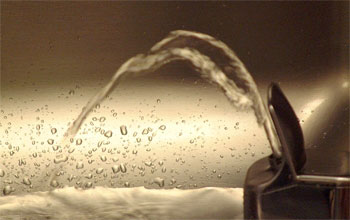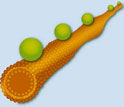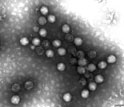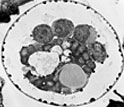News Release 08-043
Countering an Approaching Water Crisis
Researchers outline obstacles and solutions for providing water in the 21st century

Water resources are at risk around the globe, including at taps here in the United States.
March 20, 2008
This material is available primarily for archival purposes. Telephone numbers or other contact information may be out of date; please see current contact information at media contacts.
As growing demand for clean water stretches even the resources of the world's largest industrialized nations, scientists and engineers are turning to new technology and novel ideas to find solutions.
Mark Shannon of the University of Illinois at Urbana-Champaign joined a slate of world leaders in water resource research to address this crisis in a review paper in the March 20, 2008, issue of Nature.
"As dire as the growing problems are with a lack of enough clean water in the world, I have a great deal of hope that many of these problems can be solved by increasing research into the science and technology of water purification," said Shannon, who also serves as director of the National Science Foundation (NSF) Center of Advanced Materials for the Purification of Water with Systems (WaterCAMPWS).
With an emphasis on environmentally friendly tools for killing microbes, membrane bioreactors, nanoscale filtration, and a host of other advanced technologies, the review paper addresses how these systems can be used for disinfection, decontamination, reuse and reclamation, and desalination of water supplies across the globe.
"Clearly, a coordinated, multi-faceted approach is needed to deal with complex water issues," said Geoffrey Prentice, the NSF program director supporting the WaterCAMPWS center and currently on detail to the U.S. Mission to UNESCO in Paris.
"Ours is one of several agencies working to address the water crisis before it grows worse. Working with the U.S. Mission to UNESCO, we are highlighting the international dimensions of inadequate water supplies, which lead to millions of deaths each year, primarily in the developing world," Prentice added.
One example is a June 27 international water forum at the Department of State at which NSF, UNESCO and a number of agencies and international organizations will be joining Shannon and other technical experts to confront some of the most pressing global water needs.
Shannon will lead the Congress for Water Purification Science and Technologies in the 21st Century in New Orleans on April 6-10, 2008, an event that coincides with an NSF public webcast on April 10 called Water in 2025, co-hosted by Popular Mechanics. Part of the larger Bridges to the Future forum (www.nsf.gov/bridges), the event is an opportunity for the public to call-in and ask questions of some of the top water researchers in the United States.
-NSF-
-
Researchers described one new approach to disinfection last spring.
Credit and Larger Version -
This schematic shows nanoparticles diffusing on a tube composed of a fluctuating lipid bilayer.
Credit and Larger Version -
This transmission electron micrograph shows adenoviruses.
Credit and Larger Version -
This transmission electron micrograph shows a cross-section of a spore of Cryptosporidium.
Credit and Larger Version
Media Contacts
Joshua A. Chamot, NSF, (703) 292-7730, email: jchamot@nsf.gov
Rick Kubetz, University of Illinois at Urbana-Champaign, (217) 244-7716, email: rkubetz@uiuc.edu
Program Contacts
Rosemarie D. Wesson, NSF, (703) 292-7070, email: rwesson@nsf.gov
Geoffrey A. Prentice, NSF, (703) 292-8371, email: gprentic@nsf.gov
Principal Investigators
Mark Shannon, University of Illinois at Urbana-Champaign, (217) 244-1545, email: mshannon@uiuc.edu
Related Websites
A University of Illinois press release about Mark Shannon and the Nature paper is at:: http://www.engr.uiuc.edu/faculty/news/?xId=072809120742
One of the Grand Challenges for Engineering--selected by a panel of leading thinkers including J. Craig Venter, Dean Kamen, Larry Page and others--is to provide the world with access to clean water. To learn more about the challenges, go to:: http://www.engineeringchallenges.org/
A video describing the challenges is available at:: https://www.nsf.gov/news/mmg/mmg_disp.jsp?med_id=62032
The U.S. National Science Foundation propels the nation forward by advancing fundamental research in all fields of science and engineering. NSF supports research and people by providing facilities, instruments and funding to support their ingenuity and sustain the U.S. as a global leader in research and innovation. With a fiscal year 2023 budget of $9.5 billion, NSF funds reach all 50 states through grants to nearly 2,000 colleges, universities and institutions. Each year, NSF receives more than 40,000 competitive proposals and makes about 11,000 new awards. Those awards include support for cooperative research with industry, Arctic and Antarctic research and operations, and U.S. participation in international scientific efforts.
Connect with us online
NSF website: nsf.gov
NSF News: nsf.gov/news
For News Media: nsf.gov/news/newsroom
Statistics: nsf.gov/statistics/
Awards database: nsf.gov/awardsearch/
Follow us on social
Twitter: twitter.com/NSF
Facebook: facebook.com/US.NSF
Instagram: instagram.com/nsfgov






